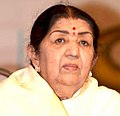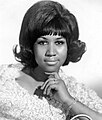Portal:Pop music
The Pop Music Portal
Pop music is a genre of popular music that originated in its modern form during the mid-1950s in the United States and the United Kingdom. During the 1950s and 1960s, pop music encompassed rock and roll and the youth-oriented styles it influenced. Rock and pop music remained roughly synonymous until the late 1960s, after which pop became associated with music that was more commercial, ephemeral, and accessible.
Identifying factors of pop music usually include repeated choruses and hooks, short to medium-length songs written in a basic format (often the verse–chorus structure), and rhythms or tempos that can be easily danced to. Much of pop music also borrows elements from other styles such as rock, urban, dance, Latin, and country. (Full article...)
Páll Óskar Hjálmtýsson (born 16 March 1970), known internationally as Páll Óskar and Paul Oscar, is an Icelandic pop singer, songwriter and disc jockey. He had a musical childhood, singing at private functions, with choirs and for media advertisements, but was affected by bullying in school and tension between his parents at home.
Paul Oscar's musical range spans traditional Icelandic songs, ballads, love songs, disco, house and techno. He released his first album, Stuð (Groove), in 1993 while in New York City, and also sang with Icelandic groups Milljónamæringarnir (The Millionaires) and Casino while establishing a career as a solo artiste. His album of ballads, Palli, was the best-selling Icelandic album of 1995. Paul Oscar came to international attention when he performed "Minn hinsti dans" ("My Final Dance"), Iceland's entry for the Eurovision Song Contest 1997. His most recent album is Silfursafnið (The Silver Collection, 2008). In Reykjavík, Paul Oscar performs regularly as a disc jockey in clubs and appears on radio and TV shows. (Full article...)Love. Angel. Music. Baby. is the debut solo studio album by American singer Gwen Stefani, released on November 12, 2004, by Interscope Records. Stefani, who had previously released five studio albums as lead singer of the rock band No Doubt, began recording solo material in early 2003. She began working on Love. Angel. Music. Baby. as a side project that would become a full album after No Doubt went on hiatus. Stefani co-wrote every song on the album, collaborating with various songwriters and producers including André 3000, Dallas Austin, Dr. Dre, Jimmy Jam and Terry Lewis, the Neptunes and Linda Perry. The album also features guest appearances by Eve and André 3000.
Designed to sound like a 1980s dance record, Love. Angel. Music. Baby. was influenced by artists and bands such as the Cure, Lisa Lisa, New Order, Prince, Depeche Mode and Madonna. The album incorporates a diverse range of genres, including electropop, dance-rock, new wave, and soul, while lyrically, it explores themes of fashion, wealth and relationships. Promotion of the album included the release of six commercially successful singles and the North American Harajuku Lovers Tour. While promoting, Stefani was often accompanied by backup dancers called the Harajuku Girls. (Full article...)General images
"Mama" is a song by the British girl group the Spice Girls. It was written by the Spice Girls, Matt Rowe and Richard Stannard, and produced by Rowe and Stannard for the group's debut album Spice, released in November 1996. "Mama" is a pop ballad that features instrumentation from keyboards, a rhythm guitar, a cello, and a violin, and its lyrics deal with the difficulties in relationships between mothers and daughters that appear during their childhood.
It was released as a double A-side with "Who Do You Think You Are", and became the official single of the 1997 Comic Relief. Its Big TV! directed music video, featured the group singing to an audience of children and their own mothers. Despite receiving mixed reviews from music critics, "Mama" was commercially successful. Released as the album's fourth single in March 1997, it became their fourth consecutive number-one single in the United Kingdom, which made the Spice Girls the first act in UK chart history to have its first four singles reach number one. It was certified platinum by the British Phonographic Industry (BPI). The single performed well internationally, reaching the top ten in many European countries and New Zealand, and the top fifteen in Australia. (Full article...)Did you know (auto-generated)

- ... that the alt-pop musician Lucy Tun cites death metal and RuPaul's Drag Race as influences?
- ... that 22-year-old singer Milena Warthon has created a new genre, pop andino, by fusing pop and Andean music?
- ... that Eternal Blue, a metalcore album, was inspired in part by 1980s pop music?
- ... that Pachelbel's Canon is notorious for being widespread in pop music, but it actually isn't?
- ... that Yoko Ono considered her 1971 song "Listen, the Snow Is Falling" to be the first pop song she ever wrote?
- ... that the first episode of the British pop music TV show Top of the Pops was broadcast on 1 January 1964 from Dickenson Road Studios, a converted church in Manchester?
Selected image -

Related portals
Pop music by decade
WikiProjects
- Wikipedia:WikiProject Pop music was created with the purpose of assembling writers and editors interested in Pop music.
- The aim of this project is to standardize and improve articles related to the various genres of Pop music, as well as to create missing articles.
- To become a member of the WikiProject (anyone may join), simply click here and add your username.
| B | C | Start | Stub | List | Category | Disambig | Draft | File | Portal | Project | Redirect | Template | NA | ??? | ||||
| 117 | 0 | 1,569 | 1,098 | 3,618 | 10,744 | 6,612 | 109 | 436 | 1,670 | 4 | 152 | 252 | 1 | 23 | 1,315 | 1,890 | 11 | 1,011 |
Associated Wikimedia
The following Wikimedia Foundation sister projects provide more on this subject:
-
Commons
Free media repository -
Wikibooks
Free textbooks and manuals -
Wikidata
Free knowledge base -
Wikinews
Free-content news -
Wikiquote
Collection of quotations -
Wikisource
Free-content library -
Wikiversity
Free learning tools -
Wiktionary
Dictionary and thesaurus











![Image 10Bing Crosby was one of the first artists to be nicknamed "King of Pop" or "King of Popular Music".[verification needed] (from Pop music)](http://upload.wikimedia.org/wikipedia/commons/thumb/4/4d/Bing_Crosby_1930s.jpg/96px-Bing_Crosby_1930s.jpg)























































